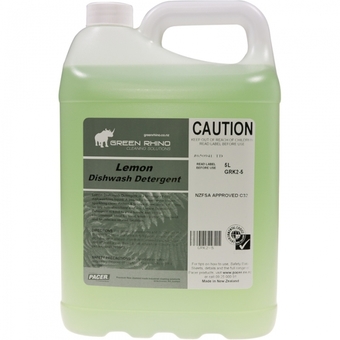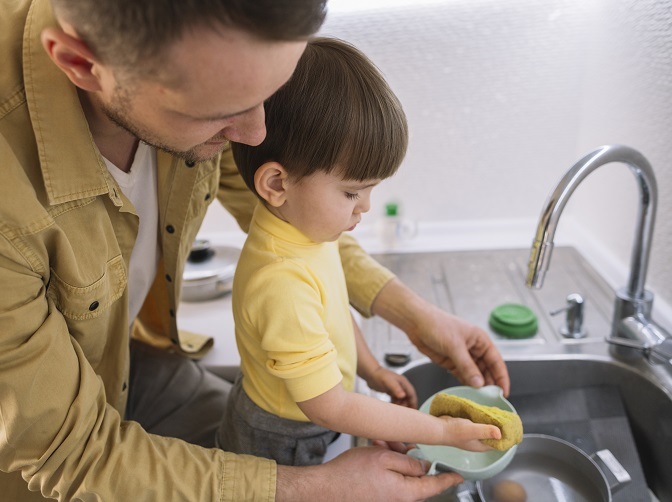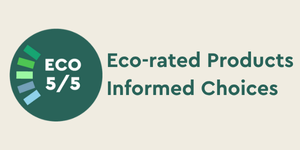What makes a good dishwashing detergent?
What makes a good dishwashing detergent?
You may think that all washing up liquids are created equal, except for the price and colour, and that it doesn't matter which one you use. However, while they are all created to do the same thing – clean your dishes – they are different.
We think a quality washing up liquid should do the best for our planet as well as your plates. It should have a pleasant scent that is not overpowering, if it has a scent at all, it should cut through grease and grime, clean the most stubborn pots and pans, and be eco- and hand-friendly, as well as effective at killing germs and other nasties.
Sounds straight forward enough, doesn’t it?
Apparently not. The cleaning aisle in the supermarket is full of brightly coloured potions, designed to catch your eye and convince you it will be the answer to making washing the dishes easier, faster, and just better. So what to choose?
What are phosphates?
First and foremost, dishwashing detergents should not contain phosphates. They are bad for the environment, because they promote algal growth in waterways, which chokes the natural vegetation and starves fish. Although now banned in many detergents and laundry detergents, they were included as they can remove oil and grease and soften water. Most dishwashing detergents now rely on enzymes and surfactants to clean, but phosphates may still be in some parallel-imported detergents. Products that are parallel imports may not comply with local regulatory requirements, even when sold under the known brand name. Having different formulations means it’s likely that they’ll perform differently.
Rule number one is to use phosphate-free detergent. We have a variety of phosphate-free products for you to check out.
Let’s talk about bubbles
The active ingredient in a washing-up liquid is a surfactant. It’s job is to remove grease from the surface by emulsifying oils and then dispersing and suspending them, so they don’t settle back onto the surface of your dishes. The most commonly found surfactants in detergents are anionic, which usually means that they create a lot of suds.
The surfactants in many popular washing-up liquid brands are petroleum-based. Fortunately, eco-friendly alternatives now use vegetable surfactants.
Dishwashers for the senses
Synthetic perfumes and colourings in washing-up liquids are also often based on petrochemicals, which may cause problems for those with sensitive skin, or they contain phthalates which are known to be an endocrine disruptor and linked to an increased risk of breast cancer and reproductive birth defects. We prefer brands that if they do have a scent, use natural fragrances such as plant oils.
Preservatives that don’t save the planet
Formaldehyde is used as a preservative in cleaners to help prevent bacteria growth. It is a respiratory irritant that can cause chest pain, shortness of breath, coughing and nose and throat irritation. It has been linked to an increased risk of asthma and allergies in children and is also recognised as a human carcinogen. So, "no" to formaldehyde in dishwashing liquids.
Parabens
Parabens are widely used in cleaning products as preservatives and some studies claim parabens contain oestrogen-mimicking properties, which are associated with an increased risk of breast cancer. Best we avoid those, too.
Anti-bacterials?
Triclosan is as an anti-bacterial, anti-fungal chemical used in household products. It is touted as being able to protect us from harmful bacteria, yet according to many industry experts, this dangerous chemical is no more effective than soap and water. It is known to be an endocrine disruptor, especially thyroid and reproductive hormones, and as a skin irritant. Sounds like we don't need antibacterial washing up liquid.
Packaging
Most washing-up liquid bottles should ideally be made of recycled material or from recyclable, high-density polyethylene (labelled PE or HDPE). We sell in large containers that can be decanted, so you can refill bottles rather than throwing them away.
 In an ideal world
In an ideal world
For clean dishes and a happy planet, a good dishwashing liquid should be hypoallergenic and free phosphates, and triclosan. It should not be tested on animals and the packaging should be made from recycled materials or come in a bulk container. We prefer vegetable-based surfactants and a little foam that goes a long way.
But wait there’s more
We can help. At Insinc, we sell dish washing liquids made from environmentally friendly materials, without all the baddies. Many of these products have Environmental Choice NZ Certification.
Feel free to talk to us about how we can help you can incorporate eco-friendly cleaners at your business. Call 0508 467 462 or you can email us at any time.
Posted: Friday 26 February 2021


